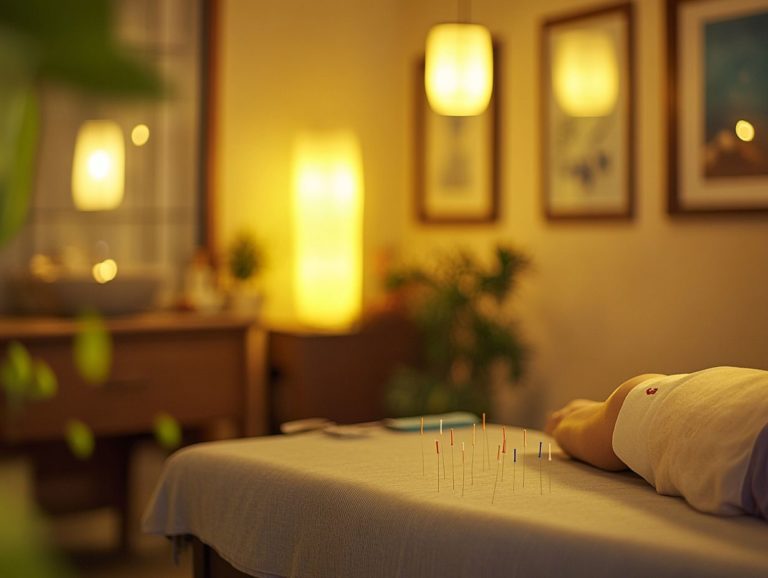5 Benefits of Acupuncture for Busy Professionals
In today’s fast-paced world, navigating effective strategies to manage stress, enhance well-being, and boost energy can seem like an overwhelming challenge, particularly for busy professionals like yourself.
Acupuncture, an ancient practice steeped in Traditional Chinese Medicine, provides a holistic approach to elevating your health and vitality.
This article unveils five key benefits of acupuncture, encompassing stress reduction, improved sleep quality, pain management, and immune support.
Learn how this adaptable therapy can effortlessly fit into your demanding lifestyle and revolutionize your overall wellness.
Contents
Key Takeaways:

Reduce stress and anxiety with acupuncture, an ancient Chinese practice that stimulates specific points on the body to promote relaxation and balance. To enhance your session, consider these tips for a successful acupuncture experience.
Improve sleep quality and increase energy levels with regular acupuncture sessions, which can help busy professionals feel well-rested and energized for their demanding schedules. Discover the surprising benefits of acupuncture you should know.
Manage pain effectively with acupuncture, which is known to alleviate discomfort and improve overall well-being for busy professionals constantly on the go. Discover 5 ways acupuncture can help with stress relief to enhance your wellness routine.
1. Reduces Stress and Anxiety
Acupuncture, an integral element of traditional Chinese medicine, offers an effective way to reduce stress and anxiety, enhancing your emotional well-being while balancing your body’s life energy through targeted interventions. Discover more about how acupuncture can benefit your overall health.
This holistic practice stimulates specific acupuncture points along your body’s meridians, which are pathways in your body through which energy flows. As a result, your body responds to this stimulation by releasing endorphins natural chemicals that elevate your mood and alleviate pain.
Scientific studies have demonstrated that these biochemical changes can significantly help manage chronic stress, leading to improved mental clarity and emotional resilience.
Many individuals report profound enhancements in their mental states following treatment, experiencing reduced anxiety levels and a greater sense of calm.
By fostering harmony between body and mind, acupuncture becomes a valuable ally for anyone seeking relief from the pressures of everyday life, as highlighted in 5 ways acupuncture can improve your mood.
2. Improves Sleep Quality
Acupuncture has proven to be a remarkable ally in enhancing sleep quality, offering effective relief from insomnia by harmonizing your body s energy and soothing your nervous system.
By focusing on specific acupoints linked to relaxation and stress reduction, this ancient practice gives your body the power to seamlessly transition into restful sleep.
Techniques like deep breathing can beautifully complement acupuncture treatments, creating a holistic strategy to conquer sleep challenges.
Many individuals discover that regular acupuncture sessions not only alleviate insomnia but also address a range of sleep disorders, transforming their nights into periods of true restoration.
With the rise of in-home acupuncture options, you can now indulge in this soothing treatment right in the comfort of your own space, cultivating a sense of safety and serenity that is essential for achieving quality rest.
3. Increases Energy Levels
Imagine feeling revitalized! Acupuncture elevates your energy levels by optimizing the flow of life energy throughout your body.
This practice not only fosters a sense of vitality but also enhances your overall health.
Targeting specific acupuncture points, it acts as gateways to release blockages and rejuvenate energy pathways.
As balance is restored within these energy meridians, you may find a remarkable reduction in fatigue and mental fog, leading to enhanced focus and clarity.
With energy flowing freely, you not only revitalize your body but also nurture your emotional well-being.
This holistic approach to health underscores the intricate connection between energy flow and physical wellness, paving the way for a more vibrant life that is both mentally and physically engaging.
4. Helps with Pain Management

Imagine feeling less pain. Acupuncture offers targeted relief for chronic pain by balancing your body’s energy and promoting endorphin release.
By skillfully inserting fine needles at precise points, this ancient practice tackles headaches and muscle discomfort. It also helps reduce joint pain and enhances overall well-being.
Research shows that acupuncture can significantly reduce both the intensity and frequency of headaches, making it a favored option for those seeking alternatives to conventional pharmaceuticals.
Many patients report experiencing fewer side effects compared to traditional treatments, illustrating a holistic approach to healthcare that values your body’s innate healing abilities.
Studies show acupuncture’s effectiveness in boosting your immune system and enhancing emotional health, showcasing its versatility as a remedy for various health concerns.
5. Boosts Immune System
Discover how acupuncture can transform your health today! It has been shown to enhance your immune system, offering remarkable health benefits by alleviating stress and bolstering your body s natural healing abilities.
This ancient practice not only eases physical discomfort but also helps manage emotional strain, which influences your overall health. When you lower your stress levels, your immune system functions more efficiently, giving your body the power to fend off illnesses with greater efficacy.
By stimulating specific points on your body, acupuncture activates immune responses, boosting the production of white blood cells and enhancing their activity.
As a result, you may find yourself experiencing fewer illnesses and elevated energy levels, leading to a comprehensive improvement in your health.
What Is Acupuncture and How Does It Work?
Acupuncture is a holistic treatment based on Chinese medicine, where fine needles are delicately inserted into specific points on your body. This practice stimulates your body s natural healing mechanisms and seeks to restore balance to your energy flow along meridian pathways.
Dating back over 2,500 years, acupuncture is founded on the principle that health flourishes in a harmonious flow of qi, or vital energy. Practitioners focus on specific points that correspond to different organs and systems, aiming to restore this essential balance.
In today s world, scientific research is beginning to illuminate how acupuncture triggers physiological responses think endorphin release and improved blood circulation. This growing understanding is paving the way for its integration into contemporary medical treatments, where it is increasingly recognized as a valuable complementary therapy for a range of conditions, from chronic pain to effective stress management.
What Are the Key Principles of Acupuncture?
The key principles of acupuncture center around the concepts of qi, meridians, and your body s intrinsic healing processes, highlighting how crucial balance and energy flow are for achieving optimal health.
When you delve into how these elements interact, you significantly enhance your understanding of holistic wellness. The idea of yin and yang is central to this dynamic, reinforcing the notion that true health emerges from the harmony of opposing forces.
Each meridian pathway acts as a channel for qi, enabling not just physical vitality, but also emotional and mental stability. When this vital energy becomes blocked or imbalanced, various health issues can surface, underscoring the necessity of restoring equilibrium.
By tackling these challenges related to energy flow, practitioners strive to alleviate symptoms and foster overall well-being, illuminating the profound interconnectedness of body, mind, and spirit.
What Are the Different Types of Acupuncture Techniques?

Acupuncture includes various techniques, like auricular acupuncture, designed to meet your unique health needs.
Auricular acupuncture focuses on the ear. It’s a popular choice for managing addiction, relieving pain, and reducing anxiety.
Traditional body acupuncture uses fine needles at specific points on your body. This method enhances energy flow and addresses chronic pain, migraines, and digestive issues.
Dry needling is a technique often used in physical therapy. It targets muscle knots to relieve sports injuries and muscle soreness.
Each method aims to harmonize your body, mind, and spirit, promoting a holistic state of wellness.
How Can Acupuncture Help with Specific Health Conditions?
Acupuncture provides relief for many health issues, including chronic pain and nausea. It s versatile and effective!
Research shows that acupuncture interacts with the body’s energy pathways, fostering overall well-being. Patients with chronic back pain or migraines often report significant improvement after several sessions.
Acupuncture is also effective for managing anxiety and depression. It stimulates points that help regulate mood and relieve stress.
Clinical trials confirm that individuals with anxiety disorders often experience notable reductions in symptoms, showcasing acupuncture’s holistic benefits.
What Are the Possible Side Effects of Acupuncture?
Acupuncture is generally safe, but it s essential to understand potential side effects related to needle insertion.
Some patients may experience mild bruising, soreness, or slight bleeding at the needle sites. These effects are usually temporary and not concerning.
In rare cases, dizziness or fainting may occur. Staying hydrated and calm before your session can help prevent these issues.
Gentle self-care, like resting and applying a cool compress, can alleviate these occurrences.
When consulting a certified acupuncturist, discuss any concerns about side effects. This dialogue enhances your treatment experience.
How Can Busy Professionals Incorporate Acupuncture into Their Busy Schedule?
Busy professionals can easily fit acupuncture into their schedules with in-home services and relaxation techniques.
To maximize benefits, book sessions during quieter moments or right after meetings.
Pairing acupuncture with deep breathing or mindfulness meditation enhances relaxation and mental clarity.
Establishing a consistent routine helps your body adapt to treatment, improving energy flow and overall well-being.
Acupuncture not only reduces stress but also builds resilience against daily challenges, making it a valuable investment in your health. For seniors, the benefits of acupuncture can be particularly significant.
Frequently Asked Questions

What is acupuncture?
Acupuncture is a traditional Chinese medicine practice. It involves inserting thin needles into specific points on the body to stimulate energy flow and promote healing.
How can acupuncture benefit busy professionals?
Acupuncture offers great benefits for busy professionals, including stress relief, pain management, better sleep, and more energy. Discovering reasons to try acupuncture for stress management can enhance your overall well-being.
How does acupuncture help with stress relief?
Acupuncture helps your body release feel-good hormones. This promotes relaxation and can also ease pain.
Can acupuncture help with pain management?
Absolutely! Acupuncture effectively treats various pains, such as back pain, headaches, and joint issues.
It stimulates your body’s natural painkillers and reduces inflammation.
Is acupuncture safe for busy professionals?
Yes, acupuncture is safe and non-invasive. The needles are sterile and disposable, and only licensed professionals perform the treatment.
How often should busy professionals receive acupuncture treatments?
Start with weekly sessions for a few weeks based on your needs. Then, you can transition to monthly maintenance sessions.






